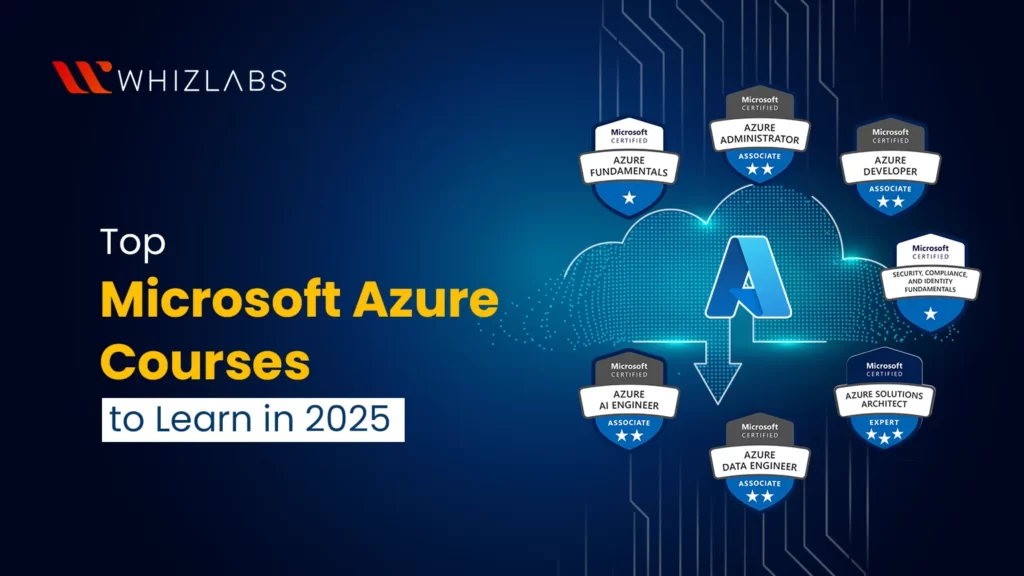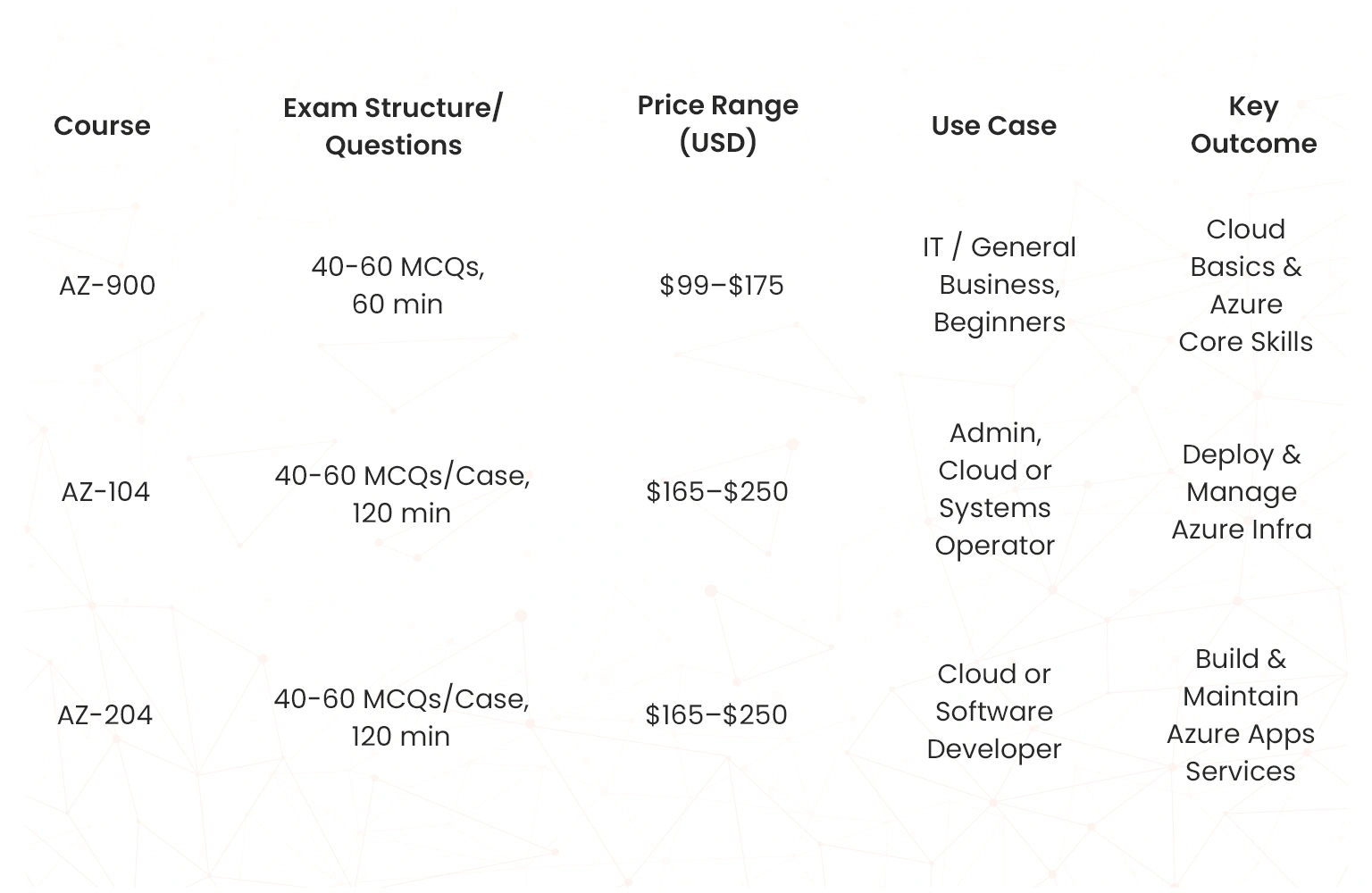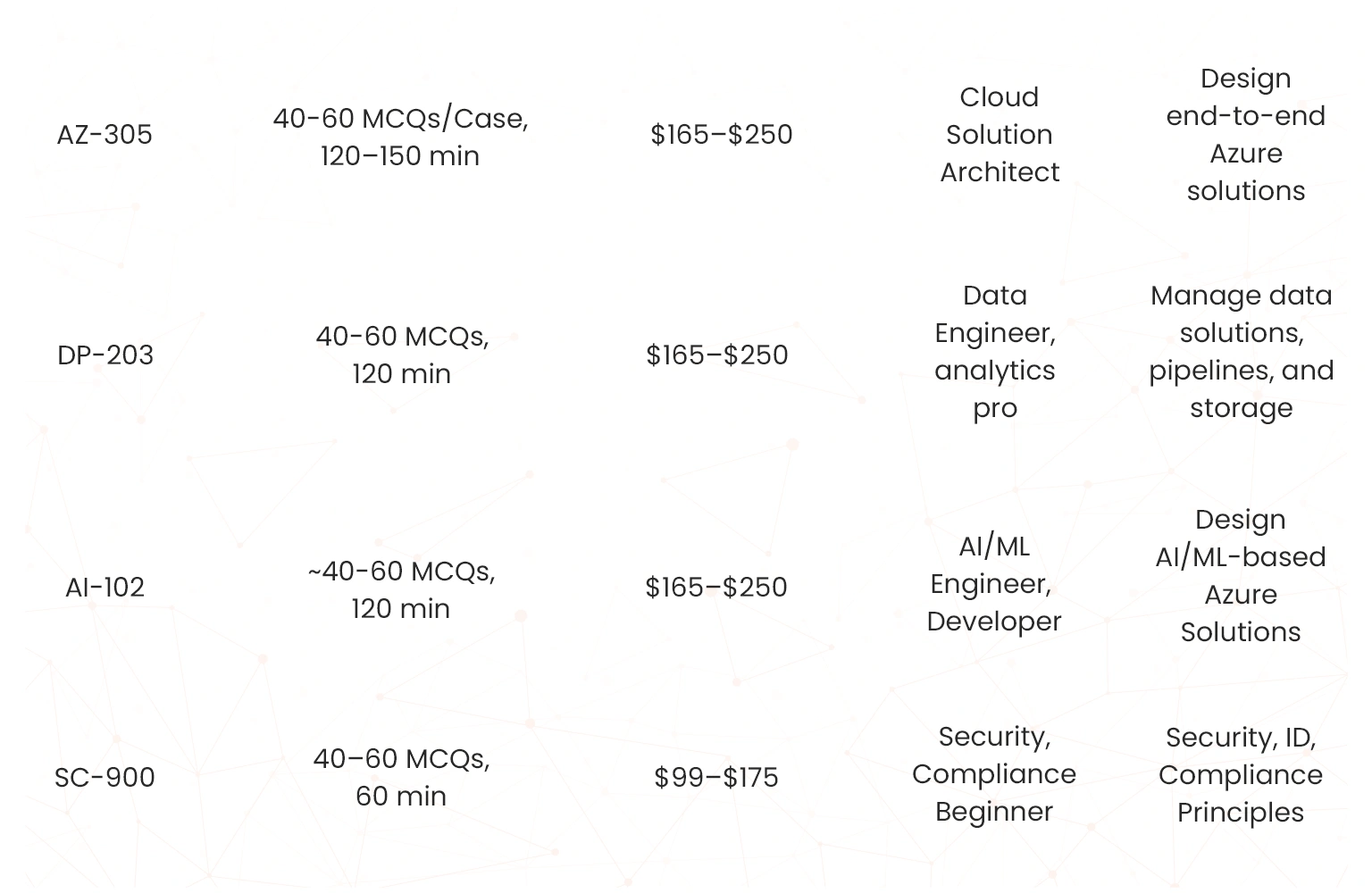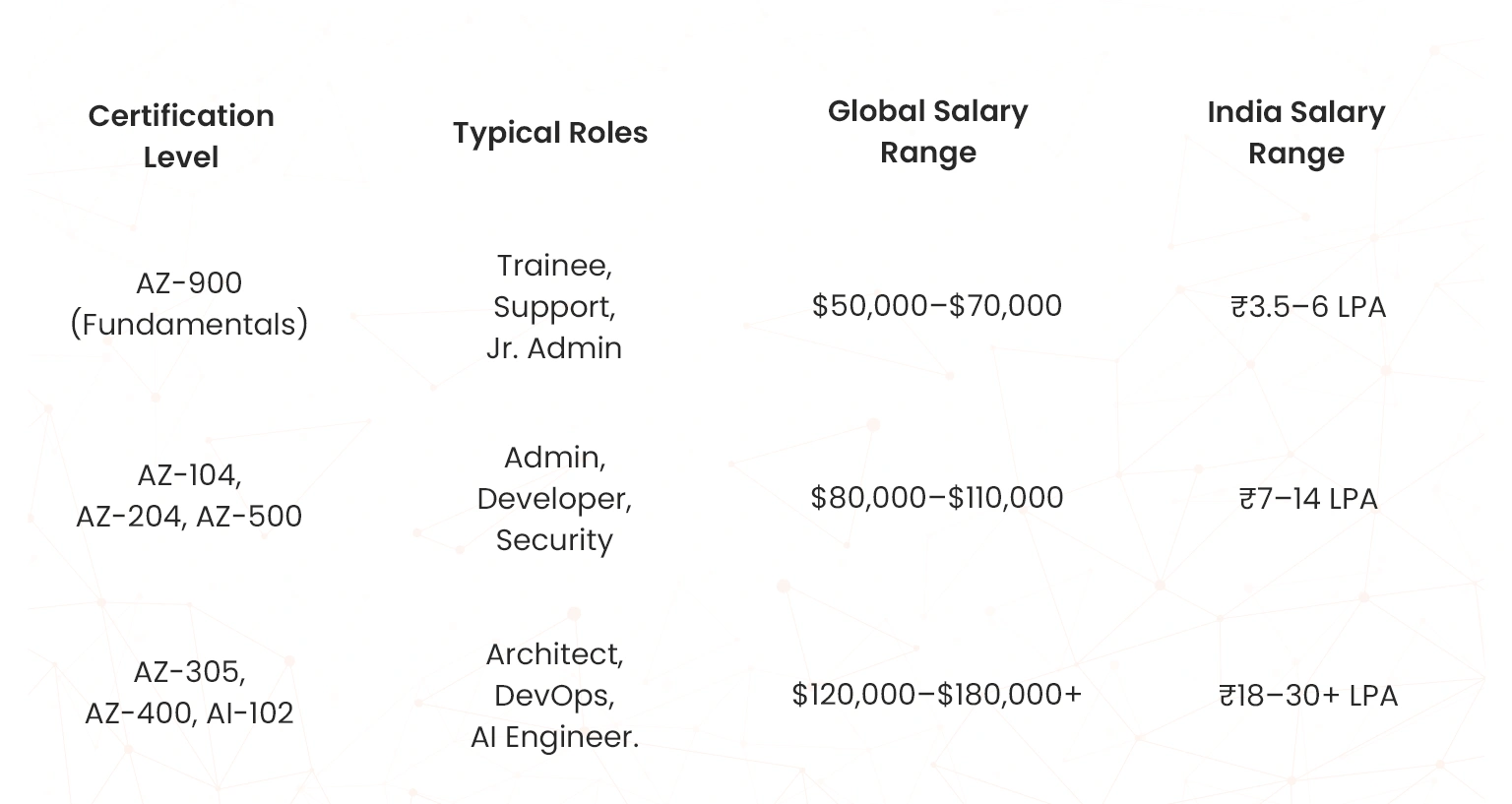In this blog, let us discuss the importance Azure plays in the market, and what the top Microsoft Azure courses are to learn now. We will get to know how Azure is marking its arc in the demanding AI world, alongside different courses, opening doors to various opportunities.
Top Microsoft Azure Courses to Learn in 2025
Here is the list of top Microsoft Azure Courses to learn and get certified before 2025. We have highlighted the course deliverables, target skills, market demand, and a detailed comparison table.
1. AZ-900: Microsoft Azure Fundamentals
- The first step is for any beginner and business/non-tech professionals who are aiming to understand cloud computing through the Azure platform. AZ 900 is the right pick. This certification needs no prior cloud knowledge.
- You will explore Cloud principles, core Azure services and architecture, security, privacy, compliance, pricing, and SLA. You get to explore how the cloud fits into business operations and digitisation.
- It’s highly recommended for sales teams, project managers, new IT hires, and anyone preparing to enter IT/cloud. This certification prepares individuals for higher-level Azure certifications and builds foundational confidence.
- AZ 900 opens doors at the intern/trainee level and is valued in business analyst and entry tech sales roles.
2. AZ-104: Azure Administrator Associate
- The AZ 104 is a key certification for cloud administration professionals, focused on day-to-day operations and management.
- You get to explore deploying/managing Azure resources, user/identity management, governance, network, virtual machines, storage, monitoring, security administration, and automation.
- The certification is highly valued for IT admin, sysadmin, and cloud support roles. It also has a strong demand in organisations migrating workloads to Azure.
- There are possible opportunities for Salary uplift, often $98 – $129K USD globally or ₹7–14 LPA in India. It also forms the base for becoming an Azure Solutions Architect.
3. AZ-204: Azure Developer Associate
- The AZ 204 certification is for developers looking to design and build cloud-enabled applications and APIs on Azure.
- From creating Azure compute solutions, integrating with Azure storage, to security, identity, monitoring, performance tuning, and CI/CD, you get to deep dive in these.
- This certification is important for cloud dev, SaaS platform, and web app developer roles. You get to demonstrate your expertise in microservices, serverless, and cloud-native architectures.
- The AZ 204 exam opens up software/cloud developer positions, with average salaries ranging $95 – $103K in the US.
4. AZ-305: Azure Solutions Architect Expert
- Azure Solutions Architect Expert AZ 305 is an advanced-level credential for designing robust, scalable, secure Azure solutions.
- Solution requirements translation, architecture design, security/governance, app/business continuity, migrations, networking, and cost management are the major topics covered in this.
- This certification is essential for lead architects, consultants, and strategic IT leadership roles. It’s also recognised by all enterprises, consultancies, and cloud-first companies.
- Among the highest Azure salaries, which is typically $132 – $192K+, the solution architect roles rank top 3 in demand globally.
5. DP-203: Azure Data Engineer Associate
- For professionals building, managing, and optimising data solutions in Azure, DP 203 is a go-to validation.
- Professionals explore and validate their skills in Data ingestion, transformation, integration, storage, security, and analytics using Azure Synapse, Data Factory, SQL, and more.
- Data engineering is growing in the tech sector, and it’s a major demand for data-driven organisations, analytics providers, and AI teams.
- It’s important to note that the Azure data engineers in the US often earn $110K+, ₹12–20 LPA in India.
6. AI-102: Designing and Implementing an Azure AI Solution
- For AI/ML engineers and developers building intelligent solutions on Azure, AI 102 Designing and Implementing an Azure AI Solution is a perfect validation.
- Natural Language Processing (NLP), computer vision, conversational AI (bots), integrating Azure Cognitive Services, and MLOps best practices are the major topics you get to explore.
- As the world demand for AI skills is rapidly rising, this certification meets the needs of companies building next-gen apps, chatbots, and automation.
- Azure AI engineers command top-tier salaries and are in high demand for cutting-edge projects.
7. SC-900: Security, Compliance, and Identity Fundamentals
- SC 900 is the entry-level badge for those who need the baseline knowledge in cloud security, identity, and compliance.
- It deep dives into threat management, identity and access management, compliance standards, Microsoft compliance solutions, and governance.
- Security specialists’ needs are higher than ever. This certification validates your skills for support, risk, and compliance roles, or as a first step toward advanced security jobs.
- This certification is the perfect launchpad for higher-level security certifications and IT security analyst positions.
Why Learn Microsoft Azure in 2025?
Azure today has very promisingly picked up the momentum in the cloud space, contributing to the overall acceleration driven by AI. Its own numbers show in double-digit acceleration with a massive capacity build-out, more than $75 billion run-rate, and multi-GW DC capacity. The demand for Azure talents is accelerating and not flattening.
“Microsoft is the second company in global history to cross $4 trillion market cap”
Azure with Microsoft 365, Security and GitHub, the integrated best-pulled Workloads, contributing to AI infrastructure investment at historical benchmarks. This is a long-term signal for assured Azure job openings and tooling.
1. Global Cloud Computing Market and Azure’s Share Dynamics
Growing at an average of 21% with 912B USD, the Global cloud computing market is massive. We witnessed enterprises spending $94 billion on IaaS and PaaS in the very first quarter. Azure (~21-25%), being the second-largest provider after AWS, internal statistics from Microsoft report a 39% year-over-year (yoy) growth, with an expectation to exceed $75 billion. Azure’s growth has accelerated over the years, and it is expanding with aggressive infrastructure CAPEX and enterprise integration, making it one of the most strategic cloud platforms to upskill in 2025.
2. Azure Career Opportunities in 2025
Based on the global market trend, the Azure roles are highly sought-after.
- Azure Administrator, the average salary is around $129K/yr
- Azure Solutions Architect earns around $225K/yr
- Azure Security Engineers get around $204K/yr
- Azure Data Scientist’s approximate salary is $165K/yr
- Other emerging roles like Data Engineer, Database Administrator, and AI Engineer, salaries range between $95K–$155K.
Platforms listing Azure roles state the average salary as $52–$80/hr on contract, and it’s at $58/hr (~$121K/yr). So if you aim to advance and pivot your career in Azure, pair it with Practical hands-on experience and multi-cloud skills. Ideal step to unlock your dream career opportunities.
3. Real-World Skills from Azure Training
- As the Azure foundation focuses more on RBAC, Policy, management groups, and cost governance, you set out in an enterprise and regulated environment when you possess scalable, secure architecture building skills.
- Azure Arc helps you manage and enforce policies across on-premises, AWS, GCP, and other environments, acting as a single control plane for multi-cloud.
- To enable portable dashboards, OpenTelemetry Integration from Azure Monitor is helpful, especially when used across multiple cloud environments. And Defender on cloud unifies security posture across cloud providers, evolving to be a key player in cloud security operations.
- As Biceps provides Azure-native speed and readability, and Terraform adds cross-cloud portability, it’s a clear indication of a collaborative ecosystem that ensures you are future-ready.
- Azure constructs, such as Private Link, Azure Front Door, and WAF, build secure, scalable, and low-latency app connections.
Put together, Azure skills are not the future, but valid and in demand even today. They get you job-ready, enterprise-grade capabilities, let you design, deploy, manage and secure a multi-cloud system very confidently.
How to Choose the Right Azure Certification in 2025?
Aligning to your existing skills, goals and your learning pace, choosing the right certification is important. Here is an analytical overview of how to make the right choice.
Beginner vs Intermediate vs Advanced Learners
- Beginners, when you are new to cloud, the Azure fundamentals AZ-900 is a great way to start your cloud journey. Covering completely from basics, the certification validates your cloud basics, pricing, security, and core Azure services.
- The intermittent dairy with foundational IT and Cloud knowledge, they can pick Associate-level courses like Azure Administrator AZ 104, Azure Developer AZ 204, etc., which particularly target job-ready skills.
- For those of you who want to niche down and specialise in professional services, such as a security Engineer, etc. With the right preparation, skillset and hands-on experience, the certification is very much doable in the first place.
Certification Path vs Skill-focused Learning
- The Certification path of Microsoft Azure is role-based (Administrator, Developer, DevOps, Architect) and ideal for learners and employers who are seeking recognition, credentials and particular about a job role. The Azure certificates are mapped to a designated path, along with Practice exams and focused labs.
- Skill-focused learning contributes to upskilling in emerging areas like AI, DevOps, and Data Security. Modular, skill-only micro courses, or applied skills labs, offer efficient target learning. This is perfect for professionals who want to fill gaps without the pressure of passing a proctored exam.
Lab-Based vs Theoretical Courses
- Utilising guided labs, sandboxes and interactive projects for training is highly recommended among the community. Learners support it and find it highly helpful in gaining hands-on experience. It’s real-time, like a playground to practice, learn and experience over memorising just the theories.
- There are a few certification courses that majorly emphasise concepts, designs, and strategy over labs. They build a solid understanding, and combining it with practical labs is important for job readiness and exam success.
Choose the right Azure Learning Path. It’s important to pick the right track to attain your success in Azure certification and career roadmap. Following and achieving these milestones paves the way to opportunities, salary, and job satisfaction. Here is a comprehensive breakdown of the pathway, market insight, key job titles, and top-paying certifications for learners.
Azure Role-Based Learning Path
1. Administrator AZ 104
Classic entry point for cloud operation roles. It focuses on identity, governance, compute, networking, and storage management in Azure environments. It’s perfect for system administrators and support engineers eyeing cloud careers.
2. Developer AZ 204
For those with coding experience, the path emphasises building, deploying, and maintaining cloud apps and services on Azure. Ideal for software engineers transitioning into the cloud.
3. Solution Architect AZ 305
This expert track is for experienced IT Professionals who focus on designing complex cloud solutions, security, and migration strategies. These Architects lead projects and teams, translate business needs into technical solutions.
4. AI/ML AI 102, DP 100
Today, AI/ML certifications are in high demand, as companies are looking for and ready to invest in AI-powered solutions and skilled employees. Implementing AI and Machine learning solutions using Azure Cognitive Services and Azure ML. It’s suitable for data scientists, engineers, and AI-focused developers.
Salary Insights of an Azure Professional
- There are proven stats that the certification has boosted the 20-30% earning potential of individuals, especially when paired with real-world experiences.
- AI and Architect roles have reached the highest-paid positions with advanced skillsets and leadership scope.
Popular Azure Job Titles and Companies Hiring in 2025
Popular Azure Roles:
- Azure Administrator
- Azure Developer
- Azure Solutions Architect
- Azure AI Engineer
- Azure Data Engineer
- Azure Security Engineer
- Azure DevOps Engineer
- Azure Database Administrator
Top Employers who are looking for Azure professionals
- Tech giants like Microsoft, Accenture, TCS, Infosys, Wipro, and Cognizant
- Consulting firms, including Deloitte, Capgemini, EY
- Major enterprises across finance, healthcare, manufacturing, and e-commerce.
- Startups and remote-first companies increasingly seek Azure specialists for flexible/hybrid roles.
To sum up
If you are starting your career in Azure, take AZ 900 (Azure Fundamentals) and proceed to AZ 104 for Administrations, and AZ 204 for Cloud Developer. To specialise and land in your dream role, you can advance with AZ 305 for Architect, AI 102 / DP 900 for AI. Choosing lab-based, hands-on courses builds on your practical experience and stands as proof of your work alongside your certification validation. Check our Whizlabs for detailed Practice tests, video courses, Hands-on labs on Azure, and Sandboxes dedicated to Azure learning. Choose the right certification and get your preparation simplified with our resources.
- AWS Generative AI Developer Certification 2026 Guide - February 12, 2026
- AWS CLF-C02 Cloud Practitioner Study Plan: 2 vs 4 vs 6 Weeks - January 30, 2026
- HashiCorp Terraform Associate 004 Preparation Guide 2026 - January 7, 2026
- Developer to AI Engineer: AWS AI Career Path for 2026 - December 19, 2025
- How to Prepare for SAP-C02 After AWS Associate? - December 10, 2025
- Complete Overview of Microsoft AB-900, AB-730, AB-731, AB-100 - December 3, 2025
- Step-by-step guide to prepare AWS AIF-C01 in 2026 - November 3, 2025
- 7 Reasons to Get Scrum Master Certification in 2025 - September 30, 2025




